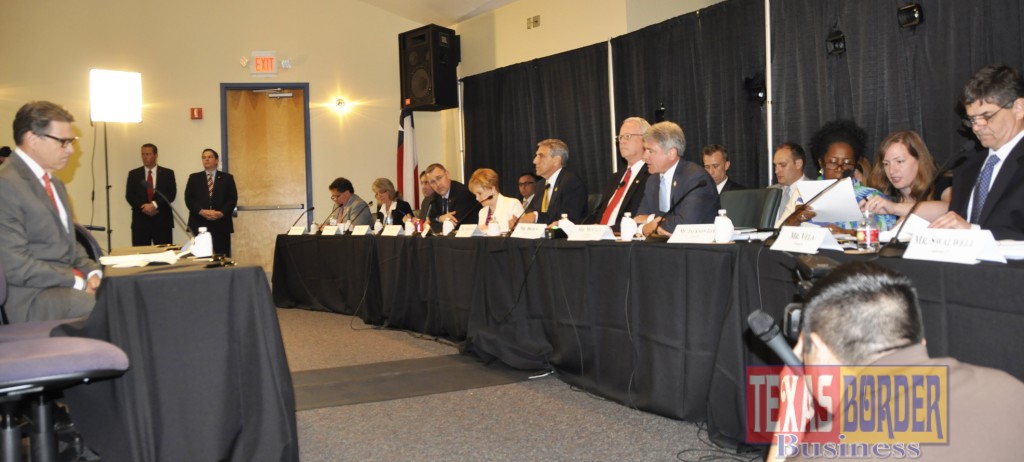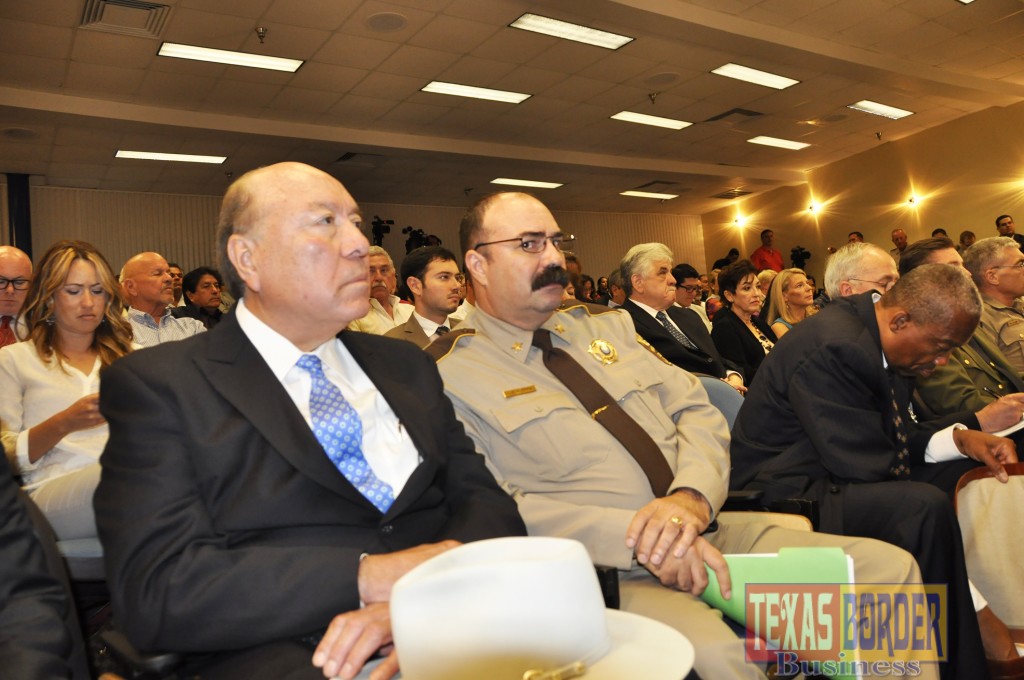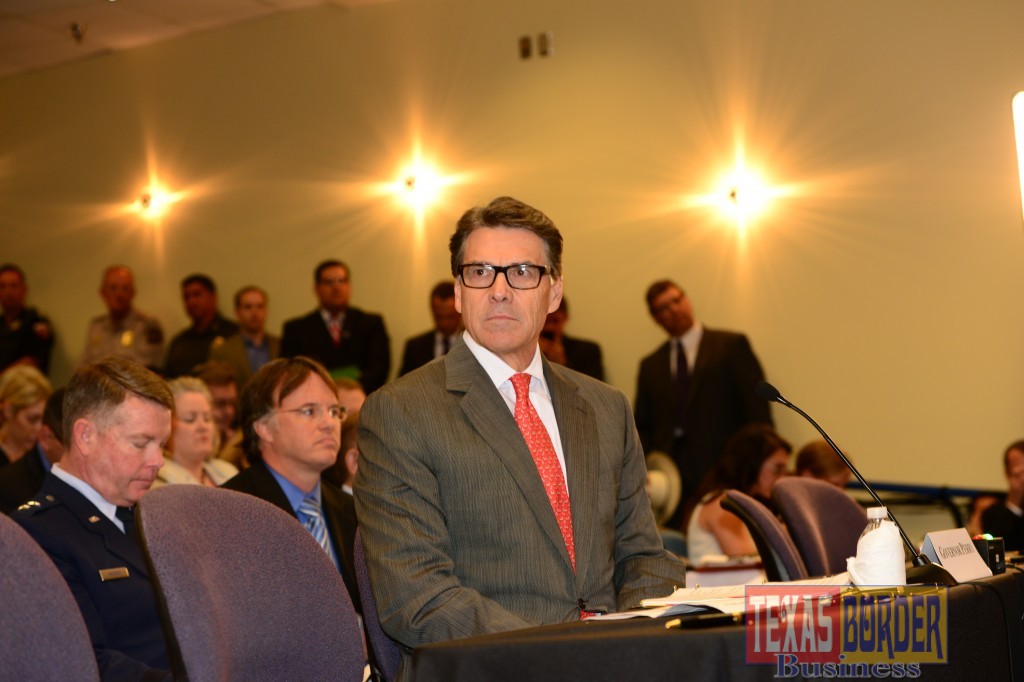
Statement of Chairman Michael McCaul (R-Texas) Committee on Homeland Security
Texas Border Business
On Thursday, July 3, 2014, the Committee on Homeland Security will hold a field hearing entitled “Crisis on the Texas Border: Surge of Unaccompanied Minors.” The Committee will meet at 12:00 noon, local time, at the South Texas College, Technology Campus, Building B Auditorium, Room 193, 3700 W. Military Highway, McAllen, Texas 78501
“Here in Texas we are facing an escalating refugee and national security crisis. Since October, more than 50,000 unaccompanied minors have crossed our Southern border into the United States – nearly two thirds of those crossed here in the Rio Grande Valley. CBP estimates that next year more than 150,000 unaccompanied children may attempt to cross the U.S.-Mexico border.
These children are being exploited by the drug cartels who are turning a profit by smuggling these kids to the U.S. at a cost of $5,000 to $8,000 per child. Many are under the age of 10, traveling thousands of miles alone through Mexico from Central America on buses or so called “death trains.” These children are often subjected to beatings, starvation, sexual assault and are at risk of being trafficked. As a father of five, I cannot fathom handing my child over to a criminal and setting them out on this long and dangerous passage.
When they arrive in the U.S., they are told to turn themselves into the nearest Border Patrol agent. Border Patrol stations, like the one we saw here in McAllen today, become holding facilities until these minors can be moved to Lackland Air Force Base in San Antonio or another shelter. Our military bases are turning into refugee camps – I never thought I would see this in America.
It is obvious that Department of Homeland Security is not adequately prepared to deal with this influx of unaccompanied children. This has left State and local officials to fill the void and takes the Border Patrol away from securing the border. This week, the White House started the process to request additional funding and measures to address this crisis, including the additional authority to remove these Central American children. In addition, the White House wants to enhance penalties for smuggling children, similar to legislation I already have introduced. I look forward to reviewing the details of these requests.
To fix this crisis, the Administration must first recognize its failed immigration and border policies are the source of the problem. At the hearing I held in Washington last week, the Committee heard repeatedly that the horrible economic conditions and violence in Central America were the only reason these kids are coming. No one questions the fact that the circumstances in these countries are terrible, but these conditions are not new, and they have not suddenly gotten worse.
What is new is a series of Executive Actions by the Administration to grant immigration benefits to children outside the purview of the law – a relaxed enforcement posture – along with talk of comprehensive immigration reform. Just this week, the President defiantly vowed to take more administrative actions on immigration very soon – such unilateral actions and failed policies are what caused this dire situation here in Texas in the first place.
The message these policies are sending is “if you come, you can stay.” This makes its way back to Central America, and more children are put in the arms of the cartels. In fact, newspapers there seem to be encouraging illegal immigration based on these policies. And recent internal DHS surveys of these children reveal that more than 70% believe they are going to remain here.
In some ways, this is true. While these kids and families are given “notices to appear,” the reality is that it will take years to work through the immigration system.
To break this cycle we need to add in some real deterrence – first, mandatory detention and then we should explore ways to promptly return those who come here illegally. Not doing so puts more young lives at risk of exploitation.
In addition, we should also better engage with the government of Mexico to step up their efforts to secure their southern border. The problem begins with Mexican officials who turn a blind-eye to Central Americans who cross the porous Mexican border. I urge the President of Mexico and his interior minister, to get serious about securing their borders as well.
Securing the border is the obligation of the Federal government. States should not be required to protect what is the Federal government’s responsibility under our Constitution. However, Governor Perry recently announced that he would surge border security operations along the border to make up for the Administration’s failures.
The President needs to immediately send the National Guard to the Southwest border to free up Border Patrol agents so that they can perform their primary mission – securing our border. Drug cartels and other criminals have and will continue to exploit any weakness in our border security efforts.
We must stem the flow and stop children from being subjected to this dangerous, and sometimes fatal, journey. I look forward to hearing from Governor Perry and our other witnesses here today about the situation on the ground and what more DHS and the Administration can and should be doing to address this problem. Details from today’s hearing will be incorporated into the findings of the Speaker’s Working Group established to investigate and make recommendations to address this crisis.
Finally, I want to recognize the tireless efforts of our Border Patrol for their compassion and care they provide to these children. Thank you from myself and all the Members here with us today.

Testimony of Governor Rick Perry

United States House Committee on Homeland Security Field Hearing: Crisis on the Texas Border: Surge of Unaccompanied Minors Testimony of Governor Rick Perry
State of Texas July 3, 2014
Texas Border Business
Good afternoon. I’d like to open my remarks by thanking and commending the members
of this committee who made the trip down here. Chairman McCaul is demonstrating true
leadership in elevating the visibility of what’s happening along the border.
I would also like to recognize Chairwoman Granger, who is leading the Speaker’s
Working Group on the Humanitarian Crisis at the Southern Border, and other members of
Congress who are here today in response to these ongoing crises.
And make no mistake, there is more than one crisis happening along the U.S. border.
The first is a humanitarian crisis, suffered by a growing number of individuals crossing
our border illegally … many of them just children.
Last week, I witnessed the difficult conditions these children are being housed in while
they await action by Washington, whether it’s the right decision to immediately deport
them, or the shortsighted and tragic decision to essentially turn them loose in the United
Some might think allowing them to stay is a more humane option, I assure you, it is not.
Nobody is doing any of these children the slightest favor by delaying a rapid return to
their countries of origin, which in many cases is not Mexico.
Allowing them to remain here will only encourage the next group of individuals to
undertake the same life-threatening journey.
Those who have come must be sent back to demonstrate, in no uncertain terms, that
risking their lives to cross Mexico and enter our country simply isn’t worth it.
Even those who have survived the treacherous journey are still at risk.
We’ve already had one confirmed case of H1N1 in Texas, and have been informed by our
federal partners of two additional cases of Type A influenza that are likely to be H1N1, in
addition to reports of other illnesses at other detention facilities.
The second crisis is a crisis of national security.
The rapid influx of illegal immigrants has strained border resources that were already
insufficient to the task at hand. Officials who should be guarding the border are dealing
with the overflow instead of fulfilling their primary tasks.
As a result, the border between the U.S. and Mexico is less secure today than at any time
in the recent past, which is why we ordered the new surge.
We know that drug cartels and transnational gangs are already seeking to take advantage
of the situation, attempting to circumvent security and spread pain and suffering on both
sides of the border through their criminal activities.
We’re also in danger at the hands of those who might be slipping through from countries
with known terrorist ties. With a range of potential threats facing us from abroad, this is
not the time to turn our attention elsewhere.
That’s why Texas has taken steps to supplement its law enforcement operations along the
Currently, we’re directing $1.3 million in additional funding per week to increase our
law-enforcement efforts through at least the end of the calendar year. This is in addition
to the more than $500 million we’ve committed to border security since 2005.
Our current operations include increased DPS aircraft patrols, maritime operations, and
the utilization of Ranger Recon teams, who are able to quickly respond to remote areas
where suspected activity is taking place.
I welcome the funding President Obama has publically announced, but also ask the
federal government for the following:
First, increase the Texas National Guard units involved in border security
operations…That includes keeping the fleet of UH-72 Lakota aircraft in Texas to
continue its vital missions.
Second, if the U.S. Border Patrol is going to release illegal immigrants into our
communities to await a court date, every one should be medically screened to ensure their
health and the health of our citizens.
Third, Texas should be reimbursed for the $500 million we’ve spent securing the border
over the past decade. We’ve been fulfilling a federal responsibility, and the hardworking
people of Texas shouldn’t have to shoulder that cost on their own.
And finally, secure this border once and for all. Invest sufficient resources to put an
adequate number of Border Patrol agents on the ground permanently, and utilize existing
technology, including drones, to help plug the gaps in security operations currently being
filled by Texans.
Thank you again for the opportunity to appear before this committee. I am happy to
answer any questions you may have.















